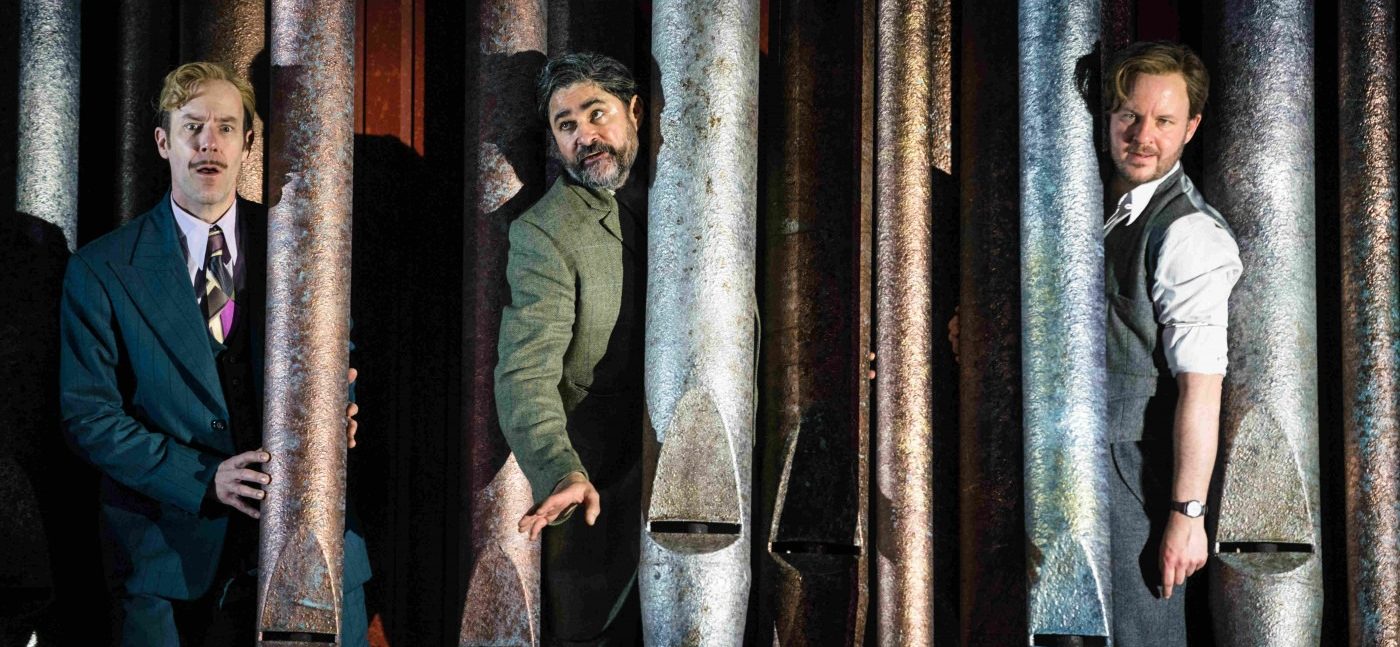Laughs, fools, and yellow stockings: The RSC’s new production of Shakespeare’s Twelfth Night is brilliantly hilarious
As the current season of plays at Stratford’s RSC – the Royal Shakespeare Company – gradually approaches its end, it seems only fitting to put on a comedic tale of unrequited love and mix-ups for Christmas time in between the dramatic productions of Othello and Hamlet. Twelfth Night, although not explicitly a play about Christmas, entails moments of laughter, hope, and bittersweet schemes which, in sum, certainly make for a joyful and well put together performance.
Through the song’s lyrics, paired with Michael Grady-Hall’s excellent vocals, the audience is reminded of Shakespeare’s aim to find humour in the hard realities of life
Twelfth Night begins with Viola, who is stranded after surviving a shipwreck. Alone and separated from her twin brother, she disguises herself as a man and becomes involved in a vastly complicated love triangle, ensuring a subsequent plot of chaos, confusion, unexpected love, and, perhaps most of all, secrecy. The cast includes Freema Agyeman as Olivia, Gwyneth Keyworth as Viola, Emily Benjamin as Priest, and Samuel West as Malvolio, with 2011 JMK Award Runner Up Prasanna Puwanarajah returning to the RSC as director, after previously directing Venice Preserved in 2019.
This production of Twelfth Night includes new original music composed by singer songwriter Matt Maltese, known for his songs ‘As the World Caves In’ and ‘Little Person’, to name some. Of Maltese’s musical additions, one of particular intrigue is sung by Feste at the end of the play during Act 5, Scene 1. In contrast to the tone of the rest of the music and that of the story itself, Feste highlights the harshness of reality within the comedy previously made of Antonio’s humiliation. Through the song’s lyrics, paired with Michael Grady-Hall’s excellent vocals, the audience is reminded of Shakespeare’s aim to find humour in the hard realities of life. Despite feeling somewhat sudden and out of place, it certainly grounds the play, giving focus to Antonio’s suffering rather than cheerfully overlooking it to focus on the happiness of other characters.
Michael Grady-Hall as Feste, however, steals the show in his brilliant dedication to foolishness, provoking laugher throughout the whole theatre almost every time he was on stage
Each character is played perfectly by its portrayer, from Freema Agyeman’s graceful and stern Olivia, to Joplin Sibtain’s drunken Sir Toby Belch, who throws himself around the stage in such feigned intoxication that you begin to wonder how he got so good at pretending to be drunk. Michael Grady-Hall as Feste, however, steals the show in his brilliant dedication to foolishness, provoking laugher throughout the whole theatre almost every time he was on stage. Clearly, with his slapstick comedy and breaking of the fourth wall, he plays homage to the traditional archetypes of the circus clown. One stand out moment put to use the theatre’s immaculate staging, lowering down a long light switch saying ‘pull me!’ which, when subsequently pulled by Feste, plunged the whole room into darkness, causing the theatre to burst into laughter. The musical additions to the production also aided Feste’s comedic moments. He would frequently burst into song, both unexpectedly and as part of the plays various subplots. The frequency of this does seem odd at first, however it later becomes a unique and expertly pulled off aspect of the production, so much so that you couldn’t imagine it being as comedically effective without.
Puwanarajah’s interpretation of Twelfth Night, paired with a brilliant cast and composer, has resulted in a production which repeatedly takes advantage of the complicated yet hilarious source material
The costuming and set, both designed by James Cotterill, were simple and not a particularly memorable aspect of the production, aside from a few moments in which costume choices helped emphasise hilarity. This was done particularly so through the portrayal of Sir Toby Belch, who at one point appeared on stage with a substantial hangover while wearing a pair of retro-style white sunglasses and a huge fur coat. There is also a moment where Feste wears a huge bee costume that is much too large for him, adding to his clown-like character. Overall, however, it does feel like a bit more could have gone into the costuming, as most characters wear the same garment throughout the play, or change only at the end during the marriage scene.
Puwanarajah’s interpretation of Twelfth Night, paired with a brilliant cast and composer, has resulted in a production which repeatedly takes advantage of the complicated yet hilarious source material, adapting it to be understandable and enjoyable for the modern audience without straying too far from its source. It makes for a memorable (near) end to the RSC’s season, undoubtedly causing nothing but excitement and anticipation for what’s to come, as their productions just keep getting better and better.

Comments